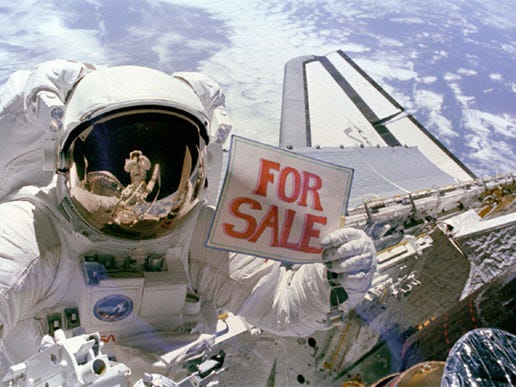On Duties
...in spaaaaace!
The wonderful thing about not charging for this newsletter is that I am accountable to no-one, which means I can go silent for six months without developing a guilty conscience. You could say that like many of the things I write about, our relationship, dear subscribers, is duty-free: we owe each other nothing.
That said: if you enjoy what you read, or want to talk about it, please share the post with a friend or send me an email. There is only one of me on the Internet, and I promise that I’m very easy to track down.
The reason for my re-materialization today is that there’s a new space station in the works… and I have questions. This is a Jeff Bezos production: his rocket company Blue Origin announced it would be teaming up with some other private space firms to create a (physical!) platform with as much habitable space and technological capacity as the International Space Station.
Private enterprise in space is nothing new, but this might be the first step towards something much bigger. Bezos has talked for years about how he expects dirty, heavy industries that “stress Earth” to move into space, along with the millions of workers working in these industries who presumably also “stress Earth” by merely existing (or at least, “stress Jeff Bezos” by expecting to get paid.)
This vision of the future is not uncommon in space/tech circles. And, if you leave humans out of the story and try not to worry too much about the ethics of polluting dark matter, I suppose it has its merits: I, too, would love to not confront yucky industrial areas the moment I leave New York City, and yearn for the oceans not to be gunked up with toxic waste so my kid can someday swim in them.
But my questions about extraterrestrial industrialization today are less ethical than well, spatial (sorry). For the past couple of months, I’ve been working on a book chapter about export processing zones—special places in one country where goods are manufactured for export to other countries. The zones typically wind up being in poor states with cheap labor, like Bangladesh; the goods made inside them get shipped off to be sold in wealthier parts of the world, like Europe.
A perk in these zones, which I’ve mentioned a couple of times in this newsletter, is that the companies in them often operate largely tax-free under a separate set of rules from the rest of the country. Between the elimination of customs duties or tariffs on the yarn, rubber, steel or other materials brought into the special zone for workers to make things out of; deals with the receiving countries to levy little to no duties on the manufactured goods themselves; and other financial or regulatory breaks to sweeten the deal, the firms doing the offshoring can save a bunch of money.
You’ve heard versions of this story before, I’m sure. These zones are now ubiquitous, nearly to the point of banality—my pals at the Adrianople group just launched a very cool new map visualizing their reach. But in their early days, export processing zones were the midcentury businessman’s version of sending heavy industry to space. These bosses did not care terribly much about how laborers they would never see would be treated at the margins of a country they would never know. They did not want their dirty business to “stress America” when they could “stress” Puerto Rico, Taiwan, or India. They could get the work done for cheap, and to top it off, convince themselves of the altruism of the arrangement: they were creating jobs! In poor countries!! For women!!! Saving the world!!!!
This isn’t to imply that every special economic zone is necessarily a smoldering hellhole; some are, but most aren’t. Still, to me, there’s a straight line between Nike’s “garment worker in Bangladesh” and Bezos’ “forklift operator on Mars.” The difference is timing and technology.
In light of these parallels, I have lots of questions and very few answers. (Please comment if you have answers.)
- Assuming the cryogenically frozen brain of Jeff Bezos pulls off his masterplan two hundred years from now, will the fruits of his employees’ space labor—the flying cars and gadgets and clothing produced in what is still no man’s land—be considered imports, or … something else? (Astronauts returning to Earth with space trash already had to clear customs, but that was to exit Kazakhstan, not re-enter the atmosphere or national airspace.)
- Will duties be determined by the country these space-goods wind up being sold in, the Earth-based registration of the space-based subsidiary, or the citizenship of its expatriate workers? (Is expatriate the right word?)
- Will the World Trade Organization get involved? (Will it change its name?)
- Will the Extraterrestrial Processing Zone (h/t Quinn!) be an anarcho-capitalist haven, or will the space station authority impose “land” or “use” taxes?
- I guess what I really want to know is: what duties do we have in space?


This species, the bipeds with big brains, really needs to be quarantined until we've figured out how to play nice among ourselves. Great read, Atossa, as always!